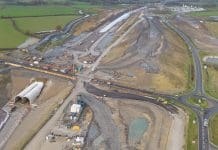Findings from the July Construction PMI indicate a strong rate of jobs growth but a reduction in UK construction output for the first time since early 2021
The July Construction PMI report has documented a fall in civil engineering and housing activity over the past month, but that supplier delays were the least widespread since February 2020.
Total industry activity was down to 48.9 in July (from 52.6 in June) and below the 50.0 no-change threshold for the first time since January 2021. The rate of decline was the fastest since May 2020.
Growth was poor in civil engineering, house building and other commercial work
Business activity in civil engineering fell to the greatest extent since October 2020 (with the July index only reaching 40.1).
For the second month running, house building declined, but the rate of contraction was only slight (index at 49.4).
Cautious client demand from rising inflation, fragile consumer confidence and higher interest rates saw commercial work buck the downturn seen elsewhere (52.3 in July), although growth was the weakest for 18 months.
A minor decrease in supplier delays and purchase price inflation indicate easing procurement pressures
Growing pressure is being felt across the industry for business expenses from higher energy, fuel and transport costs, but this was partly offset by some easing in commodity.
Purchase price inflation eased considerably (index at 78.1, down from 85.8 in June).
Supplier delays were the least widespread since February 2020, with around 22% of the survey panel reported longer lead times from suppliers in July, and 7% signalling an improvement. Imported items remained the biggest area of concern, especially those from China and mainland Europe.
Purchasing activity was at the weakest pace since January 2021, as firms tempered their stock building efforts in July in the hopes that price pressures would soften.
Robust employment numbers reflect subdued optimism across the sector
The July construction PMI data indicated an overall rise in new orders, but despite this, new business was notably weaker than seen on average in the first half of 2022.
Some companies cited a lack of new projects to replace completed contracts. Employment numbers were up in spite of many reports of difficulties filling vacancies and wage pressures.
42% of the survey respondents anticipate a rise in output during the year ahead, while only 15% forecast a decline. Reasons for this include recession concerns, the cost-of-living crisis and lower levels of consumer confidence.
Duncan Brock, group director at the Chartered Institute of Procurement & Supply, said: “After several months of difficult conditions for builders, these challenges have now resulted in a contraction in construction with the biggest fall in activity since May 2020.
“This disappointing result was felt across all the sectors, including housing which had demonstrated more resilience over the last couple of years, but fell for the second month in a row in July. However, it was civil engineering that fell the hardest and furthest. With fewer new orders in the offing, it may be some time before we see a rebound in this sector bearing in mind the time lag of infrastructure projects.
“Job creation was healthy to complete work in hand but the danger remains that should the UK economy turn unfavourable, this will affect job hiring and the development of key skills. A feather-like fall in prices may ease some of the pain as access to raw materials also improved, but prices at historically high levels will continue to hamper activity in 2023.”














